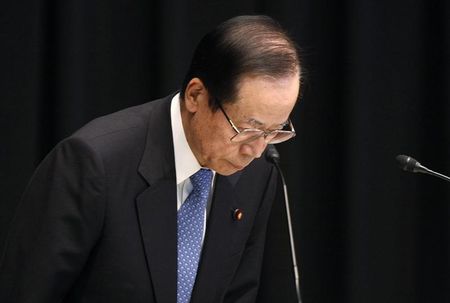By Yuko Yoshikawa
TOKYO (Reuters) - Former Japanese Prime Minister Yasuo Fukuda will meet Chinese President Xi Jinping next Wednesday in Beijing, a source familiar with the matter said, setting the stage for a possible meeting between the leaders of Japan and China in November.
Expectations have been growing in Japan for Prime Minister Shinzo Abe to meet Xi for an ice-breaking chat next month on the sidelines of a gathering of Asia-Pacific leaders in Beijing.
A one-on-one meeting of the leaders would be a symbolic breakthrough in ties between the world's second- and third-biggest economies, which have turned frigid in the past two years over a territorial row, regional rivalry and the bitter legacy of Japan's wartime occupation of China.
Chief Cabinet Secretary Yoshihide Suga confirmed that Fukuda was going to Beijing as the head of a regional forum for government and business leaders, but said the government was not aware of the details of the visit.
Fukuda went to China late in July on a "stealth mission" to broker a rapprochement and convey Abe's call for dialogue, Japanese media have reported. During the visit Xi voiced concern over two-way ties but showed his desire to mend them, the Nikkei business daily said, citing sources on both sides.
Abe has been stepping up his calls for a meeting with Xi and said in parliament that China had also been more positive about improving fraught relations.
Any talks between the two leaders at the November meeting are likely to be well-choreographed, but lack the trappings of a formal summit.
The meeting would probably only be the first step in mending relations, as deep divisions over history and influence in the region continue to divide the two countries.
Last week Abe angered Beijing by sending a ritual offering to Tokyo's Yasukuni Shrine, which China sees as a symbol of the past militarism of Japan, which occupied parts of its neighbour before and during World War Two.
Yasukuni honours millions of war dead, including wartime leaders convicted as war criminals by an Allied tribunal.

China also said on Thursday the United States was damaging stability in the Asia-Pacific region by positioning a missile defense radar in Japan. An X-Band radar system delivered this week to the U.S. military's communication facility in Kyoto is due to be fully operational by the end of the year.
(Writing by Antoni Slodkowski, Additional reporting by Kaori Kaneko and Linda Sieg; Editing by Clarence Fernandez)
